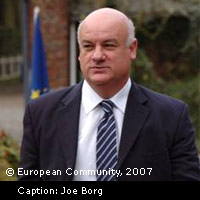Strong marine research strategy needed for the future of our seas, says Borg
Marine science and technology must be the foundations on which a future EU maritime policy is built, according to Joe Borg, the European Commissioner for Fisheries and Maritime Affairs. Speaking at the EurOCEAN 2007 conference, Mr Borg spoke of a need to tackle the threats posed by sea-related human activities and climate change on marine ecosystems. 'These two major challenges require complex responses of paramount political importance. We need to ensure that the decisions we make today are the best possible to secure the wealth and welfare of future generations. 'We strongly believe that science and technology hold the key and can allow us to reconcile the economic growth generated by sea-based activities with environmental sustainability,' said the Commissioner. In June 2006, the European Commission called upon stakeholders to contribute to the Green Paper 'Towards a Future Maritime Policy for the Union', which looks at the need for an overarching European marine-related research strategy. According to Mr Borg, stakeholder feedback has confirmed the need for this strategy and emphasised action in four specific areas. The first is the need to work across sectors in the maritime policy, as well as traditional research areas. Such an approach would entail identifying strategic cross-sectoral challenges and then providing the tools to address them concretely, said Mr Borg. At EU level, these tools could include shared cost schemes for large-scale catalysing initiatives for the better management and protection of sea resources, as well as joint calls for proposals under the Seventh Framework Programme (FP7). The Commissioner also stressed the particular importance of fostering cooperation between marine and maritime research and technology. 'We have much to gain from strengthened cooperation between these two areas,' he noted. But action at EU level alone will not bring about a stronger marine research strategy. 'To succeed we need commitment from all our Member States,' argued Mr Borg. 'We need to promote synergy between Member States' research efforts and boost value added at Community level to everybody's benefit.' He pointed to the likes of the European Research Area Networks (ERA-Nets) and their upgraded version in FP7 (ERA-Net plus) as tools that will help deliver this improved synergy. Stakeholders also highlighted the need for a strengthened marine and maritime research infrastructure in the consultation. Infrastructure is an enabling factor for research and technology. In the case of marine and maritime science, it can take the form of physical, large-scale infrastructure, such as oceanic research vessels. Or it can take the form of marine and genomic data collection networks. Mr Borg suggested that the work by the European Strategy Forum on Research Infrastructures (ESFRI) on identifying needs in the area of marine and maritime research could be further refined. The Commissioner also emphasised the importance of collecting long-term, well-validated data on the seas, and welcomed the positive feedback from stakeholders of the proposal to set up A European Marine Operation and Data Network to pursue this objective. Stakeholders, he said, also supported the Commission's proposal to establish a European Atlas of the Seas to showcase the data and raise public awareness. The fourth and final area highlighted by stakeholders concerns science and research governance. This refers to the need for the better articulation by the science community of research needs, and the development of synergies between science and industry. On the latter, the Commissioner welcomed the initiative take to set up a European Aquaculture Technology Platform. 'If conditions are met for its launching, it would represent a considerable step forward for the European aquaculture industry,' he concluded.



